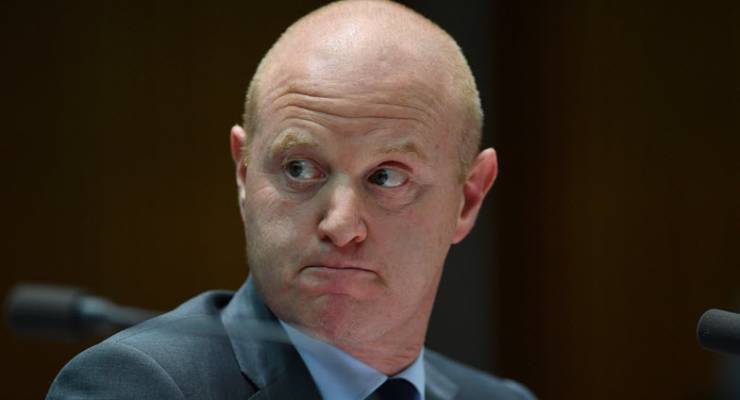
The Commonwealth Bank’s money-laundering scandal has deep, deep roots in Australia’s business community.
It was only a few days ago that we were being lectured, yet again, by the Business Council of Australia about company tax cuts, IR reform, the usual stuff — while its leaders audibly puzzled over why the community was becoming ever more hostile to big business. Commonwealth Bank CEO Ian Narev — who last week was demanding company tax cuts — is a BCA board member. Former BCA chair Catherine Livingstone has been the chair of CBA since January. Will the BCA emerge today to condemn, or even express concern, about the behaviour of one of its senior members?
The BCA describes itself as “a forum for the chief executives of Australia’s biggest companies to promote economic growth and social progress in the national interest”. As alleged by the Australian Transactions and Reports Analysis Centre (AUSTRAC) — and so far uncontested by CBA — the bank’s failure was about as far from the national interest as it’s possible to get.
Most damaging is AUSTRAC’s claim that CBA did nothing to shut down accounts, or any other action, even after being told by the Australian Federal Police that they were being used for money-laundering. And even after its own internal systems identified that accounts were being misused.
What now? Clearly the bank will want to prevent the case going to court so that the full allegations are laid out in public, and do a deal settled with the regulator — negotiations are doubtless underway about the size of the fine. Given the extraordinary number of breaches of reporting requirements — over 50,000 — the total fines facing the bank run to hundreds of times annual profits. As the Financial Review’s Chanticleer noted today, “it is hard to see a court imposing that level of penalty as it would only serve to destroy the institution. A fine of several hundred million would be manageable for a bank earning $9 billion a year.”
What will also be under negotiation are the additional requirements that the bank will agree to, such as forcing it to overhaul its internal systems and lowering the reporting thresholds for the bank.
But what will the CBA board do? A number of directors (besides Narev) were on the board when these contraventions allegedly happened. Harrison Young, who has been a director since 2007, Andrew Mohl, who has been a director since 2008, Brian Long, a director since 2010, Launa Inman, a director since 2011. Where does responsibility for what appear to be egregious and highly dangerous breaches stop? Surely a clean out of the board and some of the bank’s most senior management is needed to make an example, and to ram home the point to the wider business community that the national interest is more than just tax cuts, deregulation and going after workers.
The claims from AUSTRAC are the second against a major Australian company. In February, Tabcorp was fined $45 million for 108 contraventions of the anti-money-laundering and counter-terrorism laws. But Austrac appears to have been painfully slow in responding to what looks very much like systemic non-compliance by the CBA. And what’s happening at other banks? What’s stopping terrorism-financing via our financial institutions?
Mostly assuredly, this isn’t just about the CBA. The banking industry worldwide has a huge problem with money-laundering. In 2014 alone, banks in the US and Europe paid about US$65 billion in anti-money-laundering related fines. For example, the huge HSBC was fined US$1.9 billion in 2012 over money-laundering and is currently under a new investigation over its controls. BNP Paribas was fined US$8.9 billion in 2014 — a year when total fines levied on banks and other financial groups by regulators in the US and Europe (but not in Australia) totalled US$65 billion.
Plainly, senior people at CBA weren’t paying the slightest attention to what was happening to their overseas counterparts. Another example of just how staggering these failings are.







Crikey is committed to hosting lively discussions. Help us keep the conversation useful, interesting and welcoming. We aim to publish comments quickly in the interest of promoting robust conversation, but we’re a small team and we deploy filters to protect against legal risk. Occasionally your comment may be held up while we review, but we’re working as fast as we can to keep the conversation rolling.
The Crikey comment section is members-only content. Please subscribe to leave a comment.
The Crikey comment section is members-only content. Please login to leave a comment.